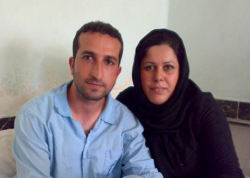Commentary: For Iranian Pastor, a Medieval Nightmare
"It's as if a scene from the Middle Ages is playing out in today's headlines"

By Dr. John Graz, IRLA Secretary General
Amidst conflicting accounts of Iranian Pastor Yousef Nadarkhani’s current legal status, one thing is clear. This young Christian pastor remains in prison waiting to find out if he will live or die. Will the Iranian state heed the outrage of the international community and release him? Or will Pastor Nadarkhani face death at the hands of a state executioner for the “crime” of following his conscience?
Pastor Nadarkhani is a young man in his early thirties, the father of two young children. In most countries of the world he would be called a good citizen, but in Iran he’s a criminal. Why? Because he is a convert to Christianity. According to written court documents, his crime isn’t that he left Islam—he became a Christian when he was 19 years old, but had never been a practicing Muslim. Instead, Pastor Nadarkhani’s death sentence has been upheld, in essence, because he has betrayed his Muslim ancestry.
Pastor Hadarkhani’s situation has moved beyond the realm of injustice; it’s simply inexplicable. How, in the 21st century, can a state charge, convict, and sentence to death one of its own citizens for disagreeing with the religious establishment? It seems anachronistic—as if a scene from the Middle Ages is playing out in today’s headlines.
Students of history are only too aware that for much of the past millennium, religious minorities have endured everything from forced conversion, to legal disenfranchisement, to torture and death. Many of the darkest passages of the past were fueled by a mingling of political power with religious bigotry. The cruel repression of religious minorities lasted centuries in Europe—from the brutal treatment of the Cathars, Waldensians and later the Lollard sect in Western Europe, to the 1492 expulsion of Jews from Spain, to the massacres of French Huguenots in the 1500s. In the past, horrors such as these have nourished unrest and revolutions, and today the memory of them continues to feed the cynicism felt by many Europeans toward religious institutions and toward religion in general.
Thomas Aquinas' view was not far from the 13th century norm when he wrote that heretics deserved "not only to be separated from the Church, but also to be eliminated from the world by death"—a task that he believed was the responsibility of both secular as well as ecclesiastical authorities.[i]
Today, more than 700 years later, this same thought is echoed in the laws of Iran, which assume that a state has the right—indeed the responsibility—to violently enforce religious uniformity. And it’s not just the state of Iran. There are more than 30 countries and provinces around the world today where honest citizens can be arrested, face legal sanctions, be imprisoned indefinitely, or even executed simply because they change their religion.
It would be well for Iran’s current leaders to study the distinguished history of some of their own great Persian kings, who at times moved against the prevailing tide of religious persecution to extend legal status and protection to minorities such as Jews, Christians and Zoroastrians.
When you deny someone the right to religious freedom, you’re denying that God created humanity with a free will. You’re saying that God is coercive; that He’s pleased by a confession of faith won at the hands of a torturer. Is this a God of love? Is this a Being we would want to worship?
I’m pleased to see that a number of countries, including the United States, Canada, France, Britain, Germany, Poland, and others, have condemned the death sentence against Pastor Nadarkhani. But it’s not enough. Every person who loves freedom must let his or her voice be heard. Everyone who rejects those dark episodes of history, where religion became a scourge rather than a solace, must speak out. Together, we must affirm that it’s not the role of a state to judge the religious choices of its citizens.
If Pastor Nadarkhani is executed it will be a victory for intolerance and a flagrant denial that religious freedom is a basic human right. May we, in speaking out for freedom, reflect the courage and commitment of Pastor Nadarkhani as he faces the ultimate sacrifice for his faith.
[i] Aquinas, Summa Theologica, quoted in Aquinas, Selected Political Writings (Oxford, 1959), p.77